MercoPress. South Atlantic News Agency
Tag: Mercosur
-
Wednesday, October 30th 2013 - 07:22 UTC
In a further step to normalize relations Paraguay names new ambassador to Venezuela
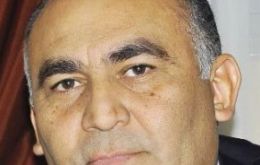
Paraguay has named veteran diplomat Enrique Jara as new ambassador in Venezuela, giving a further step towards the full normalization of relations that had been interrupted since July 2012 when the two countries expelled their respective accredited staff.
-
Saturday, October 26th 2013 - 04:59 UTC
Paraguay will lead Mercosur trade negotiations with the EU next December
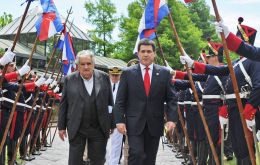
The Paraguayan foreign affairs ministry will represent Mercosur next December when the exchange of proposals with the European Union for a long pending free trade agreement, announced Uruguayan president Jose Mujica on Friday following private talks with his visiting peer from Paraguay, Horacio Cartes.
-
Saturday, October 26th 2013 - 00:25 UTC
Paraguayan president ratifies full political support for Mercosur
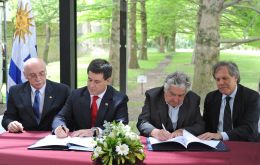
President Horacio Cartes although admitting he is heart and mind committed to Mercosur, Paraguay's full return to Mercosur is in the hands of diplomacy since as head of state he must abide strictly by the rule of the law.
-
Friday, October 25th 2013 - 06:08 UTC
Pacific Alliance economy ministers proved to be the best of the Americas in 2012
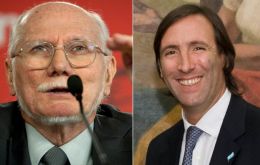
Pacific Alliance economy ministers are rated among the best four in Latin-American, while those from Mercosur can't boast such merit, much to the contrary, according to the 2012 survey from the America Economica Intelligence report, which ranks the region's ministers in that field.
-
Wednesday, October 23rd 2013 - 16:36 UTC
Most of Latam and US failed press freedoms report in 2013 says IAPA
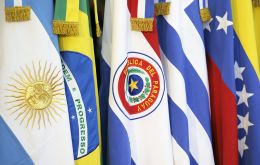
The Inter American Press Association representing journalists from across the Americas condemned violations of press freedoms in both Latin America and the United States on Tuesday, including the killings of 14 journalists, the secret seizure of Associated Press phone records and a new censorship law in Ecuador.
-
Tuesday, October 22nd 2013 - 16:34 UTC
Cartes and Mujica will address Mercosur and port facilities in Friday's meeting in Montevideo
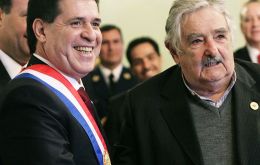
Paraguayan president Horacio Cartes will be visiting Uruguay next 25 October to meet with his peer Jose Mujica and a month later will be flying to the Vatican to visit Pope Francis, November 25, announced Foreign minister Eladio Loizaga.
-
Monday, October 21st 2013 - 05:30 UTC
Brazil confident Paraguay will be returning to Mercosur before the end of the year
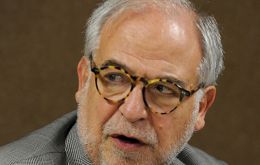
Brazil trusts Paraguay will fully return to Mercosur before the end of the year, said Brazil's Executive foreign policy advisor Marco Aurelio Garcia in a Sunday edition interview with the influential Folha de Sao Paulo.
-
Thursday, October 17th 2013 - 05:27 UTC
Paraguay vetoes bill imposing 10% export tax on cereals and oilseeds
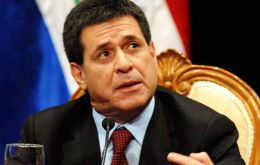
Paraguayan president Horacio Cartes vetoed the bill imposing a 10% tax on export of cereals and oilseeds in their natural state recently approved by a divided Congress, arguing it was “highly distortive and regressive”. The bill now returns to the legislative.
-
Thursday, October 17th 2013 - 01:05 UTC
Uruguay is the natural gateway to Mercosur markets Falkland Islands businessmen told
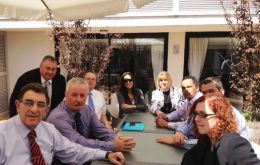
A visiting delegation from the Falkland Islands Chamber of Commerce heard on Monday from the Vice-Chairman of the Uruguay-British Chamber of Commerce, Guillermo Wild, that Uruguay offered unrivalled opportunities for trade and access to Latin American markets.
-
Monday, October 14th 2013 - 23:40 UTC
Bolivian president claims US and Pacific Alliance conspiring to divide UNASUR

Bolivian president Evo Morales claimed that the Pacific Alliance (Colombia, Chile, Peru and Mexico) is part of a major conspiration plotted “from the north” and directed to divide the Union of South American Nations, Unasur.
